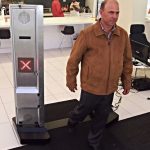 Earlier this year I wrote about a fascinating new technology that was being trialed in an airport in Norway. The technology detects when we enter the airport, and then tracks us through the airport until we’re at the arrivals hall at our destination.
Earlier this year I wrote about a fascinating new technology that was being trialed in an airport in Norway. The technology detects when we enter the airport, and then tracks us through the airport until we’re at the arrivals hall at our destination.
“When a lot of people gather in one place, queues develop quickly,” the researchers say. “Rather than stop every single person at an airport gate, we’ve developed algorithms that recognize people’s faces, based on electronic passports with a photo and ID number.”
Smoother passage
By identifying and checking passengers on the fly, it allows approved individuals to journey through the airport automatically. The facial recognition software used by the technology is already developed, and their next stage is to test it out in a number of airports around the world.
Of course, this isn’t the only innovation that is hoping to make airport security a less painful experience. A startup called Evolv Technology are undertaking tests of a new body scanner that is powered by AI.
The scanner will allow people to simply walk through particular checkpoints in the airport, and their persons will be scanned automatically. No more emptying of pockets or removing belts.
Smart scanning
Whereas the Norwegian project utilizes facial recognition technology, the Evolv scanner utilizes millimeter-wave imaging. It’s the same technology that is used in existing full-body scanners, with many questioning the privacy of the devices.
“We never build an image that would enable anyone to see anatomical details, so there’s no naked peepshow in the first place,” the company say. “None of the raw data is stored and none of the data we do keep is traceable to an individual.”
The Evolv technology differs however in that whereas existing scanners require you to stand still inside them, the Evolv ones merely require you to walk as you normally would.
The data this generates is then analyzed by a machine learning algorithm that has been trained to spot dangerous items. Only if the algorithm believes it’s spotted something dubious are security personnel informed. None of this data is stored in such a way as to allow personal identification of travelers.
It’s currently being tested out at Denver International Airport, as well as a couple of train stations in Los Angeles and Washington D.C respectively. The company believe that their scanners can process up to 800 people every hour, and whilst there will be inevitable teething problems as the algorithm fine tunes itself, the company are confident that it will eventually see security lines reduced significantly.